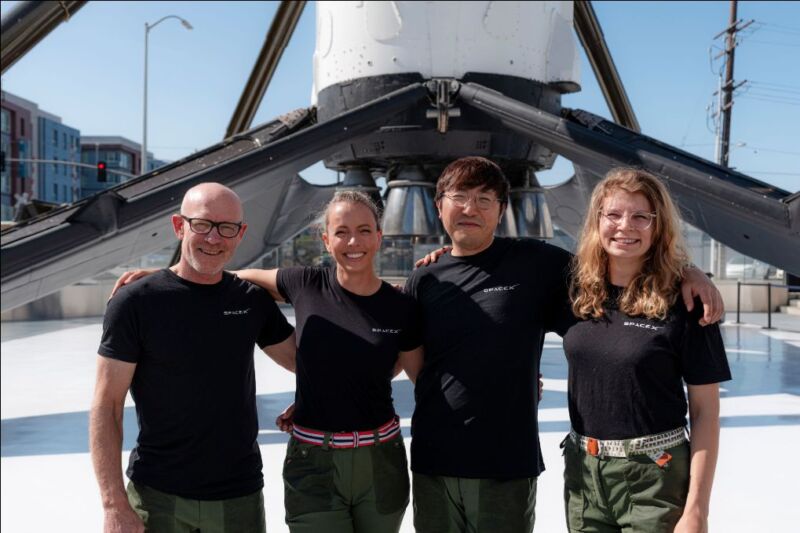

SpaceX
SpaceX will fly the first-ever human spaceflight over the Earth’s poles, possibly before the end of this year, the company announced Monday. The private Crew Dragon mission will be led by a Chinese-born cryptocurrency entrepreneur named Chun Wang, and he will be joined by a polar explorer, a roboticist, and a filmmaker whom he has befriended in recent years.
The “Fram2” mission, named after the Norwegian research ship Fram, will launch into a polar corridor from SpaceX’s launch facilities in Florida and fly directly over the north and south poles. The three-to-five day mission is being timed to fly over Antarctica near the summer solstice in the Southern Hemisphere, to afford maximum lighting.
The four-person crew will fly, fittingly, aboard Crew Dragon Endurance, which is named after Ernest Shackleton’s famous ship that was trapped in the Antarctic ice and eventually sunk there about a century ago. The spacecraft will be fitted with a cupola for both photography and filming.
This will be SpaceX’s third free-flying mission aboard Crew Dragon, following the Inspiration4 mission funded and commanded by US entrepreneur Jared Isaacman in 2021, and his forthcoming Polaris Dawn mission which may launch later this month. In an interview, Wang said he modeled the Fram2 mission’s crew and public outreach programs on the template established by Isaacman.
A background in bitcoin mining
Wang was born in China, and got in on the ground floor of bitcoin mining. “I first heard about bitcoin in 2011, and I almost immediately started mining it,” he said. “I did that for two years and that’s when I started a mining pool.”
He founded the first bitcoin mining pool in China in 2013, F2Pool. This kind of company allows miners with powerful computers to collectively “mine” bitcoin and share in the proceeds. Wang later led the decentralization of the company. He moved to Thailand in 2015, and later South Korea. He now holds a Maltese citizenship, and has more or less traveled the world since 2021. Wang said he likes to spend a lot of time in Svalbard, a Norwegian archipelago.
In an interview, Wang said he became a billionaire in 2021 after the price of bitcoin, dogecoin, and other cryptocurrencies surged. He had long been interested in space, Wang added, and so he began talking to SpaceX about purchasing a seat on a private Dragon mission. In 2023 the discussions matured, and Wang realized that if he bought an entire mission he could set its parameters.
He wanted to try something new, and flying a polar mission aligned with his interests in cold places on Earth. The highest inclination flight ever by a human spacecraft was the Soviet Vostok 6 mission in 1963, when Valentina Tereshkova’s spacecraft reached 65.1 degrees. Now, Fram2 will fly repeatedly and directly over the poles.
Meet the crew
Chun said he met two of the crew members will on a ski trip several years ago, and another in Svalbard. All share his interests in exploration, adventure, and the poles. He said it is his hope that they will all help the mission contribute to increasing humanity’s understanding of the Earth’s poles, and spread the inspiration of spaceflight.
The mission’s other three crew members are:
Jannicke Mikkelsen, Vehicle Commander: A film director and cinematographer, Mikkelsen specializes in remote and hazardous environments such as the Arctic, ocean, aviation, and space. In 2019, she served as Payload Specialist on the record-breaking polar circumnavigation flight One More Orbit mission in celebration of the 50th anniversary of Apollo 11.
Eric Philips, Vehicle Pilot: A professional polar adventurer and guide, Philips has completed dozens of ski expeditions to the North and South Poles since his first polar expedition in 1992. He is co-founder of the International Polar Guides Association and co-creator of the Polar Expeditions Classification Scheme.
Rabea Rogge, Mission Specialist: A robotics researcher from Berlin, Rogge is currently pursuing her PhD in Norway. Her work spans from having led a satellite mission to researching ocean robotics in the Arctic, reflecting her commitment to advancing technology in both the polar regions and space.
“I’m amazed that you can now become a commercial astronaut,” Mikkelsen said in an interview. “I have a pretty gnarly injury background, being in a wheelchair for a good year, and then learning to walk again between three and five years old. I wish I could tell that girl that she can become an astronaut.”